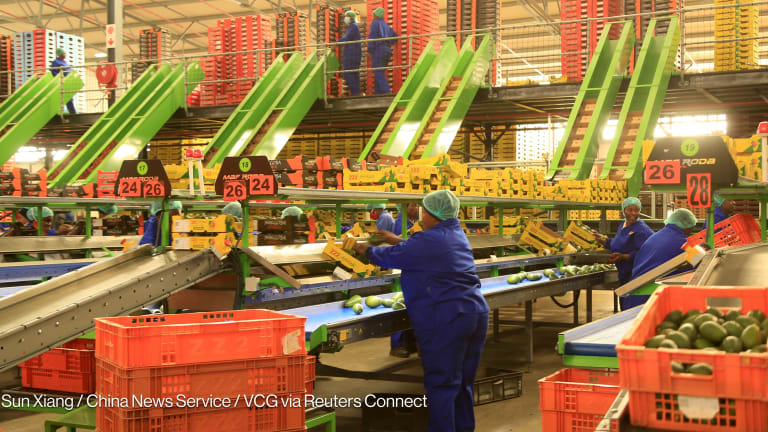
Since 2000 the continent of Africa has recorded impressive rates of economic growth. This remarkable performance has been largely driven by the prolonged commodity boom and development assistance. While the continent shows great diversity in the socioeconomic trajectories of its countries, growth rates have generally masked an underlying lack of structural transformation, which is needed to achieve socially inclusive and environmentally sustainable development.
Wherever industrialization has occurred, it has been a reliable force in steering economic diversification and has contributed to developing, strengthening, and upholding the framework conditions for competitive economic growth and development.
Over several decades, some developing countries — mainly in Asia — have been able to industrialize. Despite repeated attempts, Africa has not. If we look at the shares of global manufacturing value added for 2014, we see that the Asia-Pacific region’s share was 44.6 percent, whereas Africa’s share was just 1.6 percent. Sub-Saharan Africa is still the world’s least industrialized region, with only one country, South Africa, being considered industrialized.
African countries cannot achieve sustainable development without an economic structural transformation. They seek to change the structures of their economies by substantially increasing the shares of industry — especially manufacturing — in national investments, national output, and trade.
African countries realize that they must undergo this structural transformation in order to address a range of interconnected challenges.
One of these is the growth of the population. More than half of the continent’s 1.2 billion-strong population is under the age of 19, and almost one in five are between 15 and 24 years old. Each year, 12 million new workers join the labor force. The continent’s young people need the tools and skills to take their lives into their own hands. Industrialization is the key to ensuring that the continent’s fast-growing population yields a demographic dividend.
Another associated challenge is migration. Many of Africa’s most ambitious and entrepreneurially minded young people feel compelled to join migration flows to the North. No country can afford to lose this potential. Migration remains a complex issue, but industrialization can address one of the root causes by creating jobs in the countries of origin.
In addition, the threat posed by climate change hangs heavily over countries where agriculture remains the primary employer. Africa needs to apply and develop green technologies and channel investments into resource efficiency and clean energy. These investments can lower the cost of bringing power to rural areas, while contributing to global efforts to mitigate climate change.
Africa must industrialize, and it must do so in a socially inclusive and environmentally sustainable manner.
Previous efforts to foster sustainable economic transformation in Africa have failed, and the need for a new approach is clear. What is needed now is a broad-based and country-owned process that leverages financial and non-financial resources, promotes regional integration, and mobilizes cooperation among Africa’s development partners.
This is the motivation behind the United Nations General Assembly’s proclamation of the period 2016-2025 as the Third Industrial Development Decade for Africa, or IDDA III. The United Nations Industrial Development Organization is leading the new approach for the IDDA III. We are fully supporting the focus on partnerships for resource mobilization and offer a tried and tested example of how to implement the approach: the Programme for Country Partnership.
UNIDO’s PCP combines technical assistance with policy advice, standards, and investments leveraging to support the design and implementation of industrialization strategies and instruments that can make a sizeable impact on a country’s development.
Since 2014, the model is being successfully implemented in two African countries — Ethiopia and Senegal — as well as in Peru. The PCP is aligned with each country’s national development agenda and is a multi-stakeholder partnership model. It is designed to build synergies with ongoing government and partner interventions, while mobilizing funds and leveraging additional investment toward sectors with high growth potential.
The PCP focuses on a select number of priority sectors or areas that are essential to the government’s industrial development agenda. Priority sectors are typically selected based on job creation potential, availability of raw materials, export potential, and ability to attract investment. Its approach is designed to create synergies with partner programs or projects relevant for industrial development in order to maximize impact.
One particular area of focus is strategic partnerships with financial institutions and the business sector in order to leverage additional resources for infrastructure, industry, and innovation, as well as knowledge, expertise, and technology.
Mainstreaming of the PCP approach to other African countries can be a significant contribution to the successful implementation of the Third Industrial Development Decade for Africa. UNIDO stands ready to support Africa on its path to inclusive and sustainable industrial development.
Join the Devex community and access more in-depth analysis, breaking news and business advice — and a host of other services — on international development, humanitarian aid and global health.
Read more Devex coverage of Global Goals Week:
▶ What is your #GlobalGoals commitment? — Twitter chat with Devex and Johnson & Johnson
▶ Opinion: The SDGs are good enough and it's time to stop analyzing and start acting
▶ President Kagame discusses controversial third term, aid independence
▶ New UNDP administrator looks to define agency's value, create fresh strategic vision
▶ Amid global crises, UNGA will show development community rising to the challenges








